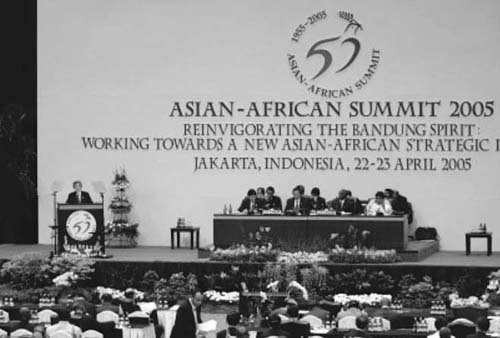Japan's Official Development Assistance White Paper 2006
Main Text > Part II ODA DISBURSEMENTS IN FISCAL YEAR 2005 > Chapter 2 Details about Japan's ODA > Section 2. Measures for Each of the Priority Issues > 4. Peacebuilding > (3) Sudan
(3) Sudan
In response to the conclusion of the North-South Comprehensive Peace Agreement, the Oslo Donors' Conference on Sudan was held in April 2005, attended by representatives of more than 60 countries (including Japan), regions and organizations, as well as by UN Secretary-General Kofi Annan, to garner broad international support for the implementation of this agreement. At the Oslo Conference, the representatives pledged a total amount of US$4.5 billion over three years from 2005 to 2007, surpassing the requested amount of assistance of US$4.1 billion.43 The the pledged amount of assistance thus fulfilled the aim of strengthening coordinated assistance by the international community for the implementation of the peace agreement. The then Senior Vice-Minister for Foreign Affairs Ichiro Aisawa, who attended the conference as Japan's representative, pledged assistance in the amount of US$100 million for the near term in order to support the consolidation of peace in Sudan. In June 2005, Japan dispatched a governmental survey mission to Sudan to have a dialogue with the Sudanese Government aimed at resuming bilateral assistance, and initiated consideration of modalities of specific future assistance.
Based on these, Japan has to date provided implemented assistance primarily through international organizations. Japan decided assistance as follows: in July 2005, a total of ¥1.2 billion in grant aid for food assistance, food self-sufficiency support, and support for preventing infectious childhood diseases; in September of the same year, a total of ¥3.4 billion in grant aid to assist the full-scale return of refugees and internally displaced persons to Sudan's southern region upon the end of the rainy season; in November of the same year, a total of ¥760 million in grant aid for conflict prevention and peacebuilding to implement the Interim Disarmament, Demobilization and Reintegration Program (IDDRP); and in February 2006, medical support for the victims of conflict.
In addition to assistance through international organizations, Japan has also provided bilateral assistance. Specifically, Japan is conducting the "Emergency Study on the Planning and Support for Basic Physical and Social Infrastructure in Juba City and Surrounding Areas," including elements of community support, based on the approach of the African Village Initiative. In this effort, a full-scale local study was initiated in January 2006 together with urban planning assistance for Juba City, which is the capital of the southern regional government, and an emergency project for improving the living environment, including the surrounding community. Japan has held international cooperation seminars for human resource development through JICA aiming to provide opportunities for studying reconstruction development and basic approaches to peacebuilding in post-conflict countries while at the same time fostering understanding which will be required for the implementation of Japan's ODA projects in Sudan in the future. Specifically, international cooperation seminars were held twice in Japan for 10 administrative officials of the northern and southern regions, and third country training in various fields has been provided in Ethiopia, Kenya and Egypt.
With respect to the Darfur issue,44 Japan encouraged parties concerned, including the Sudanese Government, to make efforts toward its solution, in line with the UN Security Council. In addition to providing humanitarian aid, Japan has supported the activities of the African Union (AU), which plays a leading role in solving this problem. For humanitarian aid, Japan provided a total of US$21 million in 2004. In 2005, it provided US$7.5 million in assistance for the return of refugees and displaced persons and for food aid. Japan also provided approximately US$2 million in March 2005 to support the AU's efforts concerning the conflict in Darfur. Furthermore, the then Prime Minister Koizumi, in his policy speech delivered at AU Headquarters in May 2006, called for an early signing of the Darfur peace agreement, and indicated that Japan would provide additional emergency assistance of approximately US$8.7 million to support the activities of the AU and US$10 million of additional humanitarian aid.
The then Prime Minister Junichiro Koizumi announced the overall enhancement of assistance to Africa, as well as support for peacebuilding, at the Asia-Africa Summit held in April 2005. Assistance to Sudan is a typical example of assistance for the "consolidation of peace," which Japan emphasizes as an important pillar of its policies for Africa. Its success could become a model case for future policies.
Chart II-23 Record of Japan's Assistance for Sudan to Consolidate Peace (as of October 2006)


The then Prime Minister Koizumi delivering an address at the plenary session of the Asian-African Summit 2005 (Photo: Cabinet Public Relations Office)


 Next Page
Next Page